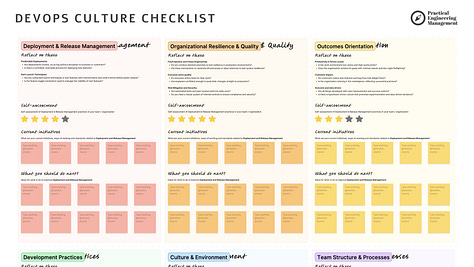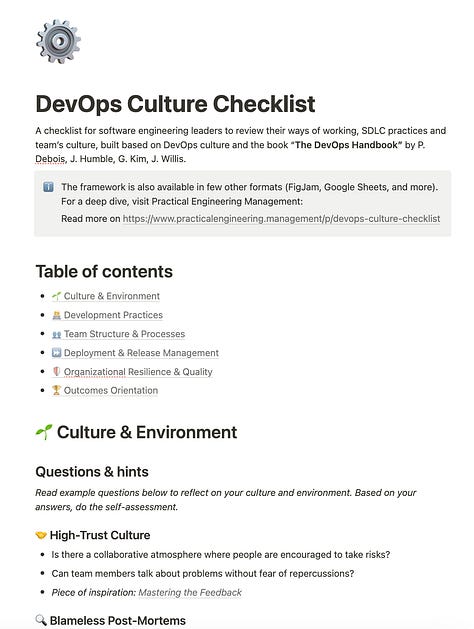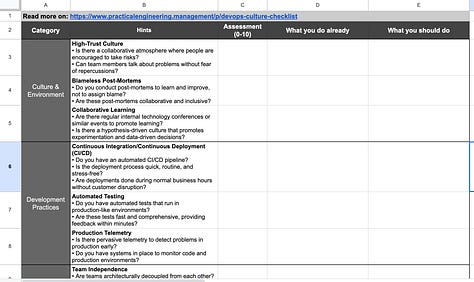As engineering leaders, we should build a strategy that maximizes our team's impact on the organization's success. Simply ensuring that your team's tasks are executed is not enough; you must develop a comprehensive plan that drives cumulative outcomes.
In the past few weeks, I've shared some ideas on achieving this goal. In a nutshell, you should create a culture of candid feedback and establish multiple information streams.
With this level of awareness, you can use your insights to reframe your problems and point out real challenges or create a long-term strategy with clear diagnosis, guiding policies, and coherent actions. Certain strategic blocks can help you achieve this.
While this approach to building long term plan can be effective, it is also complex and time-consuming. To simplify this process, we can go a more straightforward way, which I would like to explore today.
DevOps Culture
The tech industry, despite being ever-evolving, has decades of accumulated experience and best practices from thousands of successful organizations worldwide. Although most tech organizations consider themselves unique, they often tackle classic and well-known software engineering problems. This implies that many proven practices can work in your organization as well—rather than reinventing the wheel, we can adapt existing industry standards to meet our needs.
You can use the DevOps Culture, a mindset that fosters collaboration and shared responsibility among engineering and other teams to deliver high-quality software quickly and reliably.
DevOps culture promotes a high-trust environment where continuous feedback and learning are valued, leading to improved software quality, quicker releases, and increased resilience. It prioritizes automation and process efficiency, allowing teams to deliver customer value more rapidly and reliably. Ultimately, DevOps culture encourages experimentation and continuous improvement, fostering organizational agility and success.
For a comprehensive resource on building a DevOps culture, I highly recommend reading The DevOps Handbook.
DevOps Culture Checklist
To ease your transition into DevOps culture, here's a checklist you can use to self-assess your team's or company's approach to building products.
For your convenience, I also prepared:
Google Sheets
Notion template
FigJam whiteboard



You can get them at the bottom of this article.
Table of contents:
Culture & Environment
Development Practices
Team Structure & Processes
Deployment & Release Management
Organizational Resilience & Quality
Outcomes Orientation
Culture & Environment
High-Trust Culture:
Is there a collaborative atmosphere where people are encouraged to take risks?
Can team members talk about problems without fear of repercussions?
Read more on PEM: Mastering the Feedback
Blameless Post-Mortems:
Do you conduct post-mortems to learn and improve, not to assign blame?
Are these post-mortems collaborative and inclusive?
Read more on PEM: Safety Leadership and Neuroception
Collaborative Learning:
Are there regular internal technology conferences or similar events to promote learning?
Is there a hypothesis-driven culture that promotes experimentation and data-driven decisions?
Read more on PEM:
Development Practices
Continuous Integration/Continuous Deployment (CI/CD):
Do you have an automated CI/CD pipeline?
Is the deployment process quick, routine, and stress-free?
Are deployments done during normal business hours without customer disruption?
Read more on PEM: The Role of Engineering in Product Model Transformation - Changing the Way Product Is Built
Automated Testing:
Do you have automated tests that run in production-like environments?
Are these tests fast and comprehensive, providing feedback within minutes?
Production Telemetry:
Is there pervasive telemetry to detect problems in production early?
Do you have systems in place to monitor code and production environments?
Read more:




